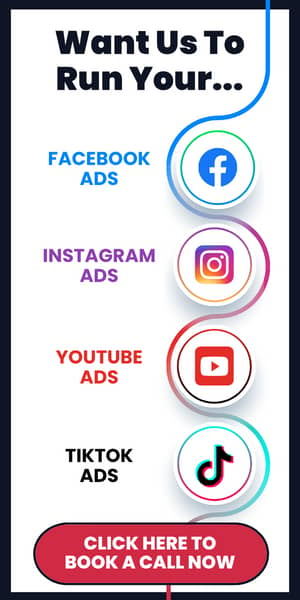We have hired 36 media buyers who have gone on to manage over $100,000,000.00 in ad spend over the past five years.
In this article, we’re going to show you our exact process for hiring A-Player Media Buyers so that you don’t have to make the same mistakes we’ve made along the way.
Including:
- Common pitfalls for managers or owners to avoid when you’re hiring media buyers
- Exactly how we quantitatively and qualitatively hire using the WHO Hiring method
- The 4 unique identifiers we’ve found in top talent after hiring over 36 media buyers who have gone on to manage over $100 million in ad spend
We’ll be answering the age-old questions: What makes a great media buyer? And, What do we look for when hiring a media buyer?
We’ll also give you a behind-the-scenes look at:
- The exact hiring process we use to filter out low-quality talent
- The 3 questions we use in our assessment to easily identify high-level media buyers with problem-solving abilities
- How to set up this system for hiring media buyers yourself
Why Do So Many People Struggle With Hiring Media Buyers?
One of the biggest challenges is determining which candidates are all talk and which ones can prove that they can do the job well.
There are a lot of people who are good at interviewing, but there are FEW people who are good at interviewing AND can actually back up what they say.
For example, one of the candidates we were interviewing looked great on paper. It “appeared” he had all the bells and whistles required to make a good media buyer, like:
- Managed over $1 million in ad spend
- Worked on Facebook, Google, and TikTok accounts
These are the media buyers who have gotten good accounts but don’t truly understand the intricacies of how the strategy actually works.
But when we went really deep on the interview with the candidate we caught a few red flags…
Big Mistakes To Avoid When Hiring
When we asked the candidate about how he would solve a very specific media buying problem (rising cost per booked call), he had no idea what to do.
We found out that he had gotten lucky and was basically handed really good accounts on a silver platter.
The point is, we wouldn’t have found this out unless we had gone really deep in the interview process.
What Process Do We Follow To Make Sure We Identify These Red Flags and Avoid Making Costly Hiring Decisions?
We have included both qualitative and quantitative aspects in our process to make sure our media buyers are truly the best for the job, not just all talk.
The Quantitative Process
Our quantitative process for hiring involves using a well-designed and mapped-out scorecard which has a specific rubric for each outcome we’re requiring them to hit.
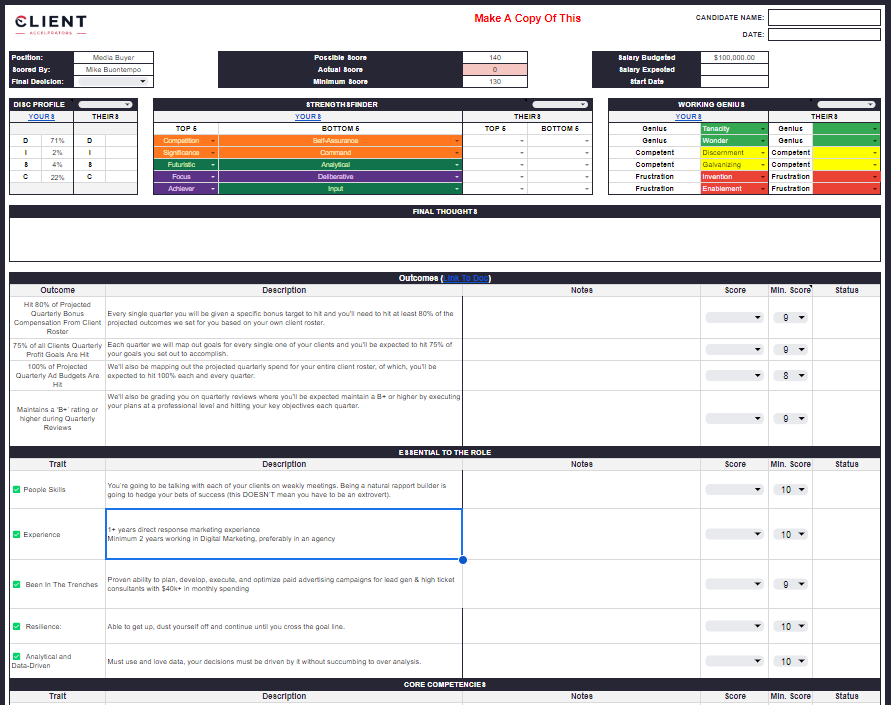
Taking The DiSC Assessment
The DiSC Assessment is “a behavior-assessment tool that aims to help people understand their leadership styles and improve workplace teamwork,” according to Business News Daily.
DiSC stands for Dominance, Influence, Steadiness, and Conscientiousness.
It assesses an individual’s primary and secondary behavioral traits, helping to understand how they tend to interact with others and approach tasks.
The DiSC is commonly used in team-building exercises to help team members understand each other’s working styles and collaborate more effectively.
Learn How You Work
Take your DiSC assessment to figure out how you work and have your candidates take it as well.
For example, I’m a strong D-type which means I’m direct, strong-willed, and forceful. I am also fast-paced and skeptical. I’m also high in Conscientiousness (C) so I’m private, analytical, and logical.
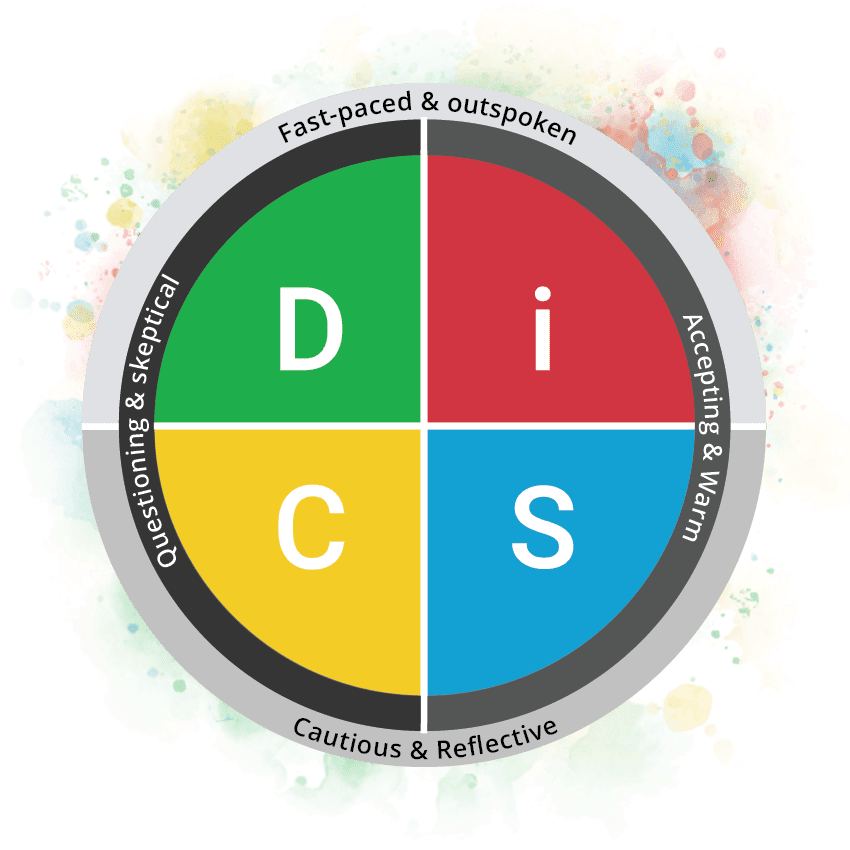
Link To Disc Assessment: https://www.thediscpersonalitytest.com
Compare Your DiSC Profiles
Put your DiSC profiles side by side. See if their personality matches up with yours and determine whether their skill sets will be complimentary or problematic.
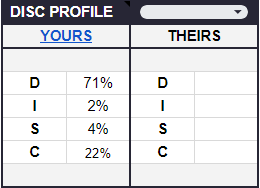
For example, I probably wouldn’t work well with someone else who is high in their D-Type (we’d likely be butting heads). I would however work well with a high S-type who’s more gentle, accommodating, and soft-hearted—granted they have some backbone.
Taking The Clifton Strengths Finder
The Clifton Strengths Assessments help you discover what you naturally do best. It helps you learn how to develop your greatest talents into strengths to maximize your potential.
You and your potential hires need to take the Clifton Strengths Finder quiz to discover your top 5 biggest strengths as well as the top 5 areas you have the biggest deficit.
You’re looking for diversity here and not to “buy a friend”.
For example, I’m high in the competition, significance, futuristic, focus, and achiever categories. I’m low in the self-assurance, command, analytical, deliberative, and input categories. That means I’d like to work with someone who is high in the categories where I am low, and vice versa, so that we complement each other.
Compare Your Profiles
Put your top 5 and bottom 5 side by side on the scorecard so you can clearly see yours and theirs.
I’m looking for people who complement my strengths well and will make up for my deficits but also pair well with my work style.

Link To StrengthsFinder Assessment: https://www.gallup.com/cliftonstrengths/en/home.aspx
Taking The Six Working Geniuses Test
Discover where you lie on the six types of working genius and determine which of the six you’re a genius at, competent at, or is actually frustrating for you.
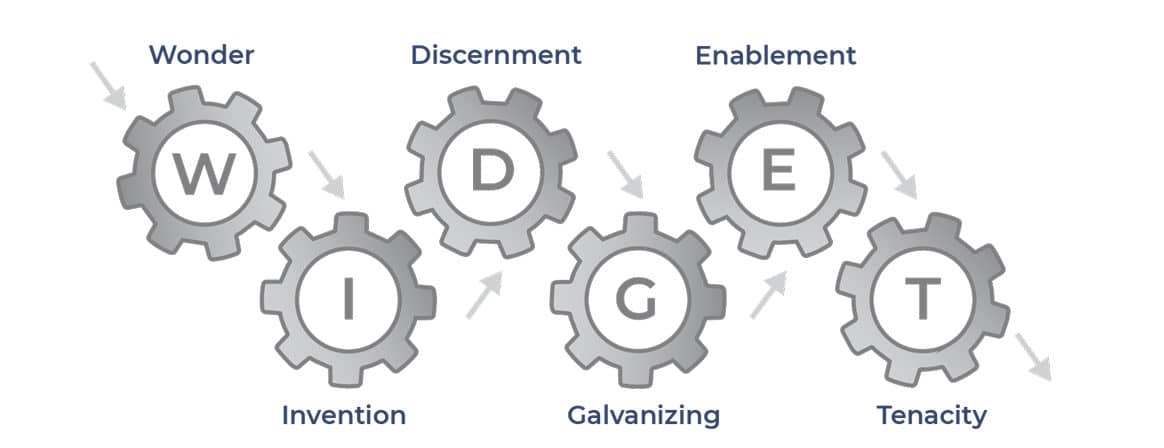
Link To Assessment: https://www.workinggenius.com
Compare Your Working Genius Profiles
As we did with the previous tests, line up their work genius with your own on the scorecard to see if they have complimentary genius zones. I’m looking for people whose genius lies where I’m only competent or get frustrated by.
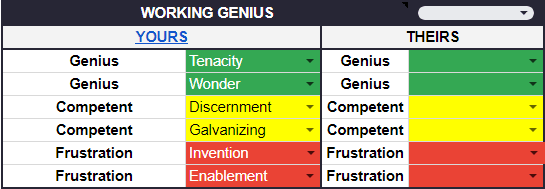
Scorecard: Outcomes
Consider the outcomes you’d like to hit, provide a brief description of what that could look like, and then ask for examples of how they’ve done that in the past or how they would handle those situations in the future.
When you are clear on the outcomes you want to achieve, it will be easier to find the best media buyer for the job.
Here’s an example of what an Outcomes sheet could look like.

Scorecard: Essentials To The Role
Determine five traits that are essential for the job. Then write out what they mean to your company and what they look like in practice.
The five essential traits we consider are:
- People skills
- Experience
- Been in the trenches
- Resilience
- Analytical and Data-driven

Scorecard: Core Competencies
Core competencies define the skills and traits that give an edge over others. We define these traits and describe how they play out in our everyday work.

Follow A Rubric
We set up a grading rubric for each one of our outcomes, essentials, and competencies. This helps us make an objective decision.
In our rubric (shown below), we define the distinctions between poor, good, and strong media buyers.
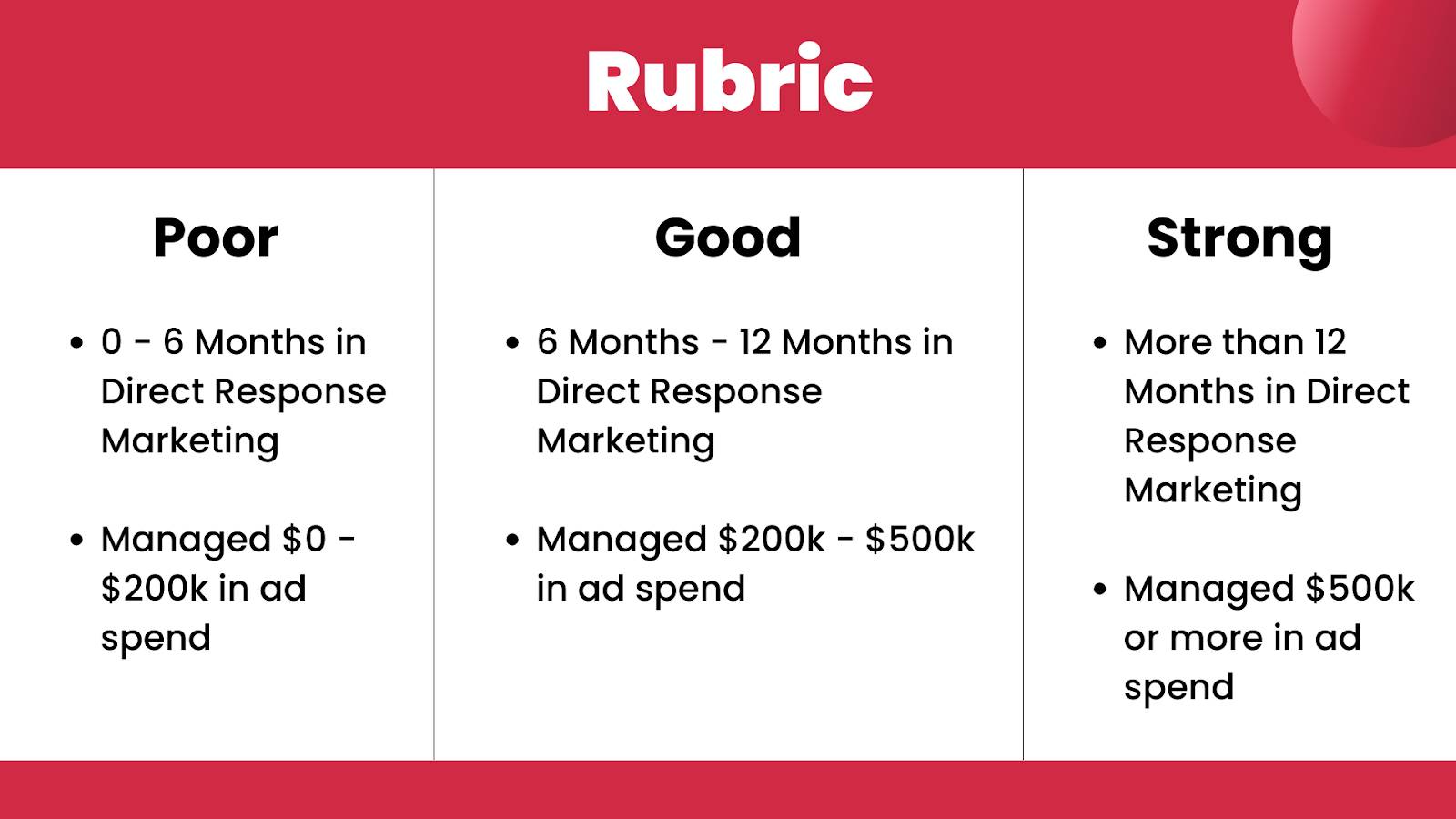
Four Unique Identifiers For Great Media Buyers
There are four unique identifiers we have found that make for great media buyers.
- Competitive nature. Competitive people tend to be highly motivated to succeed and achieve their goals. In the world of media buying, success is often measured by metrics like ROI, conversion rates, and campaign performance. A competitive media buyer is driven to excel and outperform the competition, which can lead to better results for their clients or company.
- Video gamers. Media buying is similar to playing video games in the sense that you have to develop a winning strategy to achieve your objectives. Both require you to think quickly and adapt to changing situations. Media buyers may need to adjust ad placements in response to market changes, while gamers make split-second decisions during gameplay.
- Sports affiliation. Having a knack for competition and knowing how to be a part of a team are both important skills when considering the collaborative efforts required in media buying when working with creative teams, clients, or other stakeholders.
- Military affiliation. Military personnel are known for their discipline and ability to adhere to strict routines and guidelines. In media buying, discipline is crucial for managing advertising budgets, adhering to schedules, and following established processes. It helps ensure that campaigns run smoothly and efficiently.
Interviewing: Exact Hiring Process For Media Buyers
Our five-step process starts with a screening interview, and then goes into a WHO interview. Next, we send assessments, do a focused interview, and then conclude with a reference interview. Let’s deep dive into each of these 5 steps, what they look like, and how they play out..
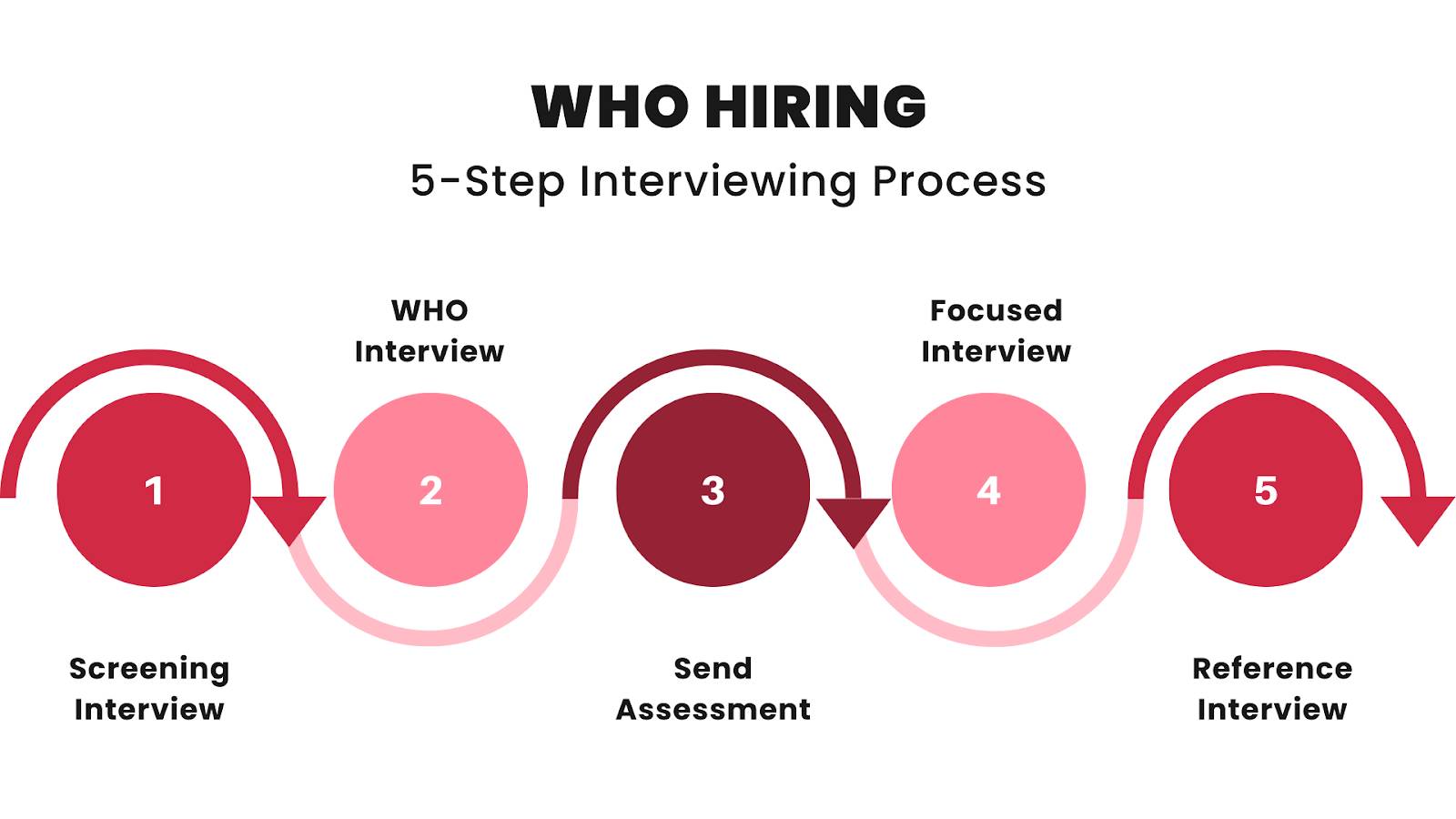
Screening Interview
During this initial overview, there are four primary topics to cover:
- Go over career goals. You want to hear the candidate speak with passion and enthusiasm about topics related to the goal.
- What are they good at professionally? Get 8-12 positives to build a complete picture of their skill sets.
- What are they NOT good at professionally? Get 8-12 negatives to build a picture of their weaknesses.
- Talk about their last five bosses and how each will rate their performance when you reach out to them
WHO Interview
The purpose of this interview is to discuss their last 3 positions with them in great depth. Here are some talking points:
- What they were hired to do
- Accomplishments they’re proud of
- Low points during the job
- The people they worked with
- Overall performance
- Salary progression
- Why they left that job
Ideal Answers
When you have these conversations, listen for someone who exceeded what they were initially hired to do in their roles. You are looking for someone who has achieved really big things that overqualify them for the role and someone who speaks respectfully both about their peers and their previous bosses.
Likely their salary grew with them and they left because their ability to learn was capped out.
Send Assessment
There is a 2 Part Assessment – both a spreadsheet and a Google Doc – that we will show you below.
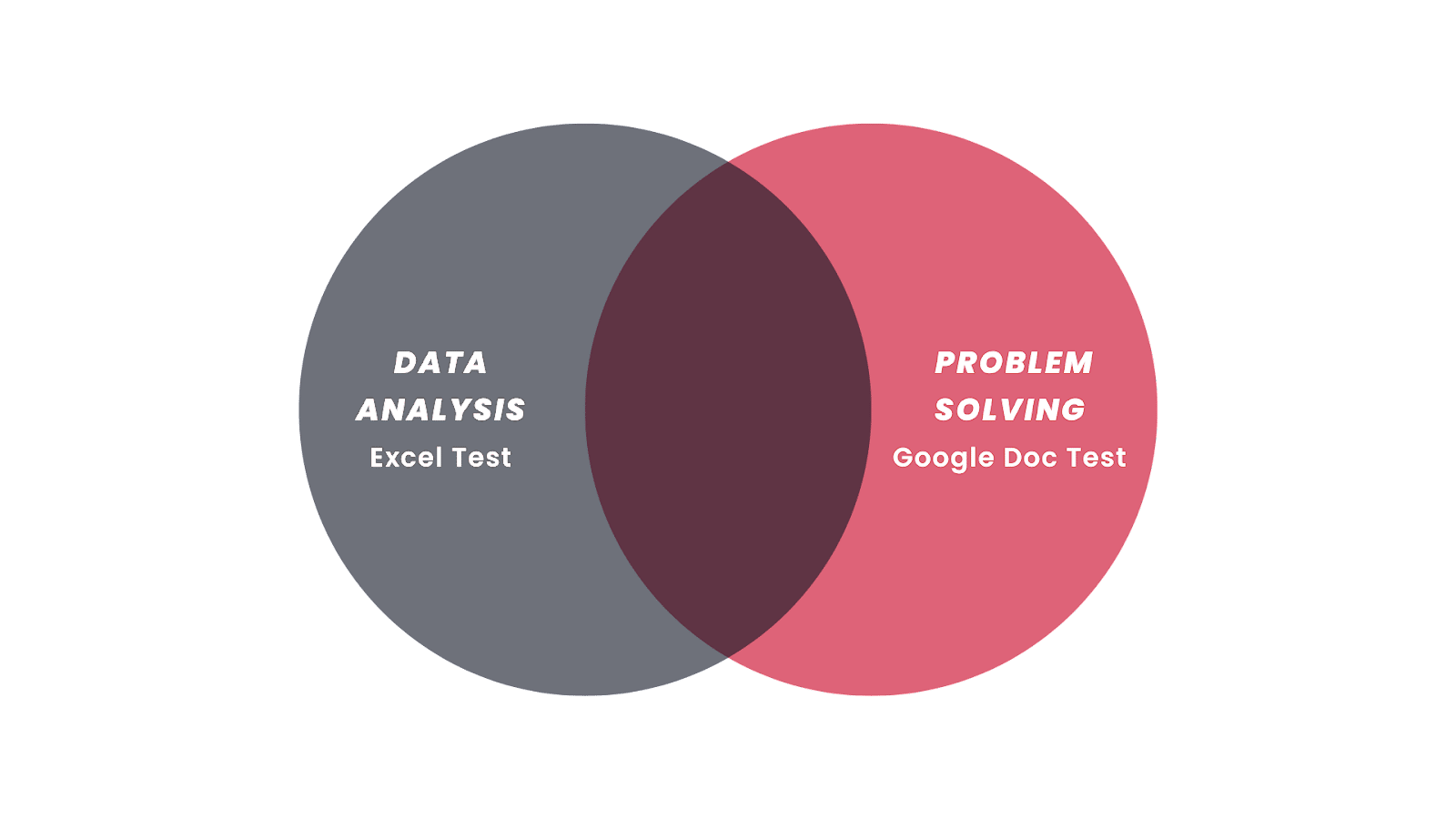
Spreadsheet Questions – Part 1
In part 1, we give them a bunch of data they need to sift through and organize. If they don’t know how to do basic data analysis and work in a spreadsheet, then they’re not the media buyer for us.
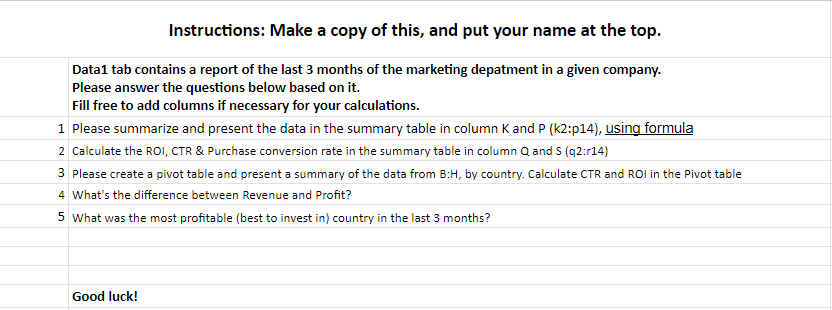
We then have them answer specific questions only a proficient media buyer would know such as how to calculate ROI, CPL, and CPA with only a few select data points (like the example below):
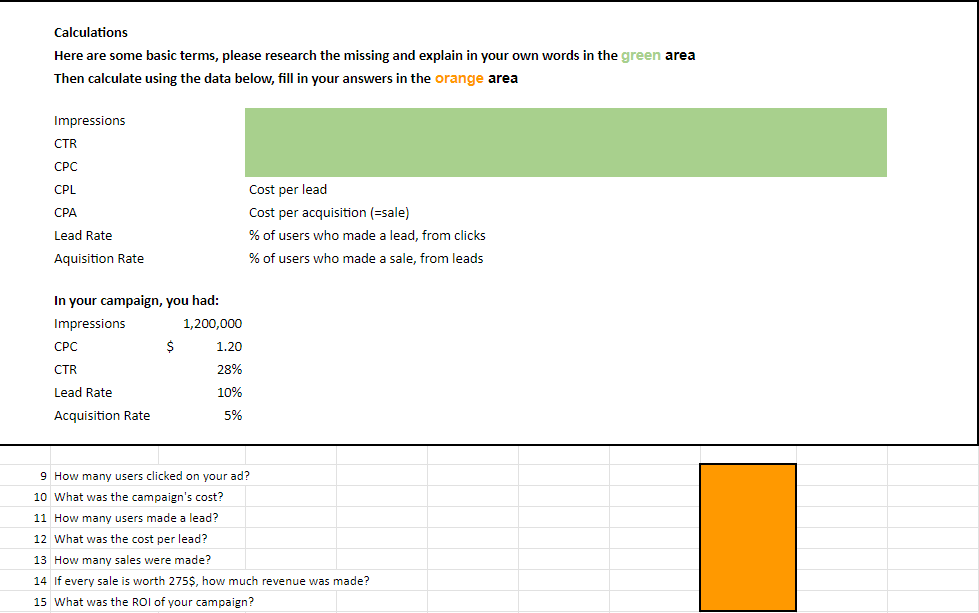
Google Doc Questions – Part 2
Speaker Notes: Talk about question #1 and the importance of scenario-based questions in the assessment. Briefly describe why you chose this question and the type of answer you’re looking for.
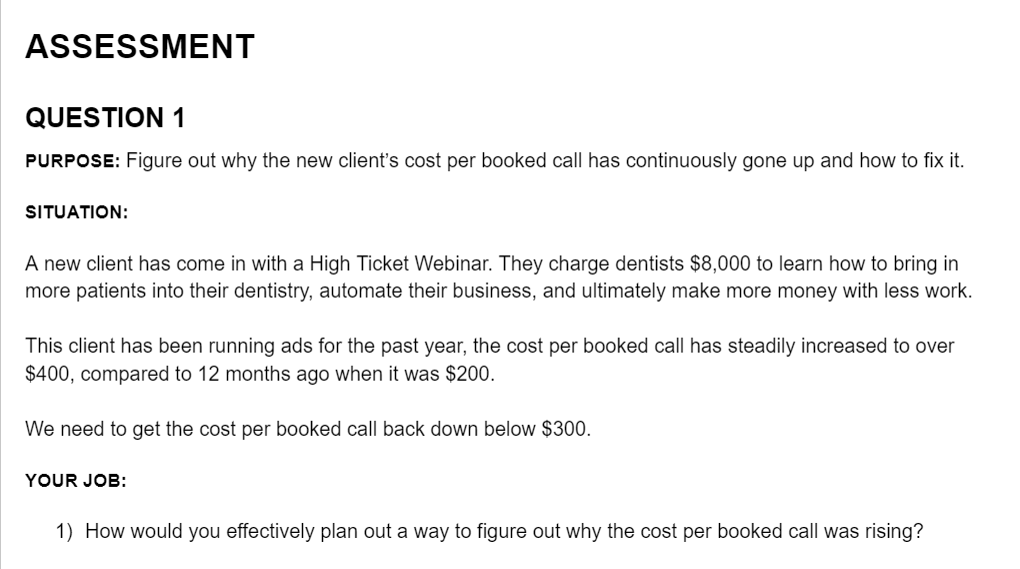
Since click-through rates are a crucial metric to understand, we ask this specific question to make sure they understand the importance and that their skills meet our expectations.
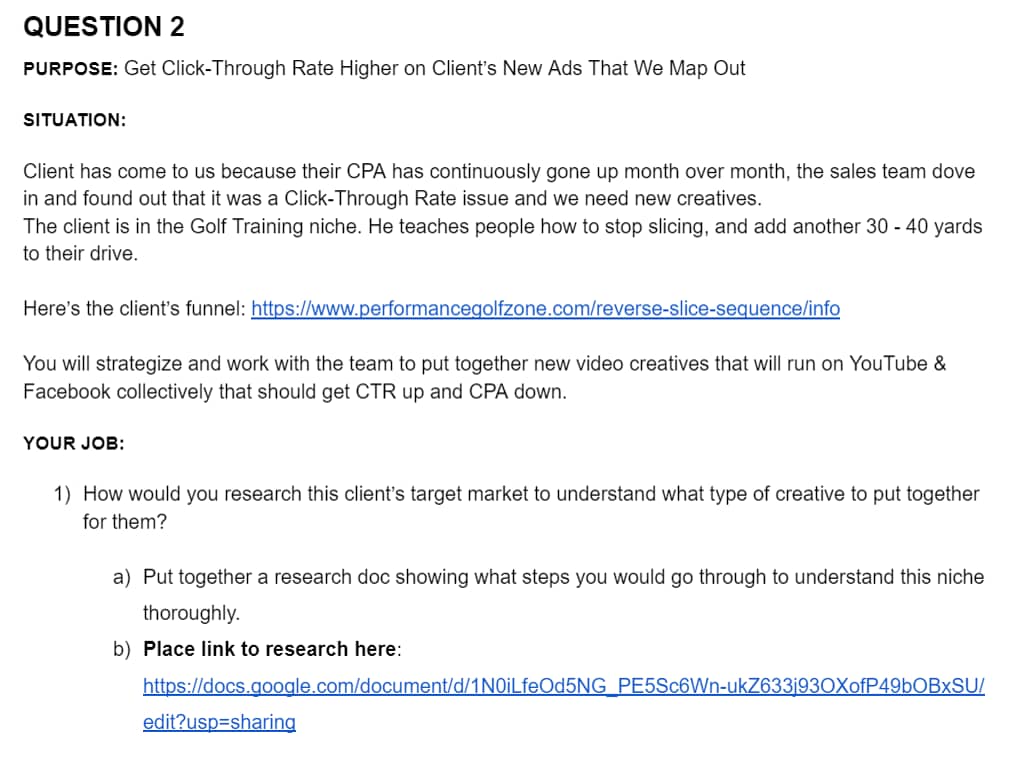
This next question links them to the excel spreadsheet simulations mentioned above.
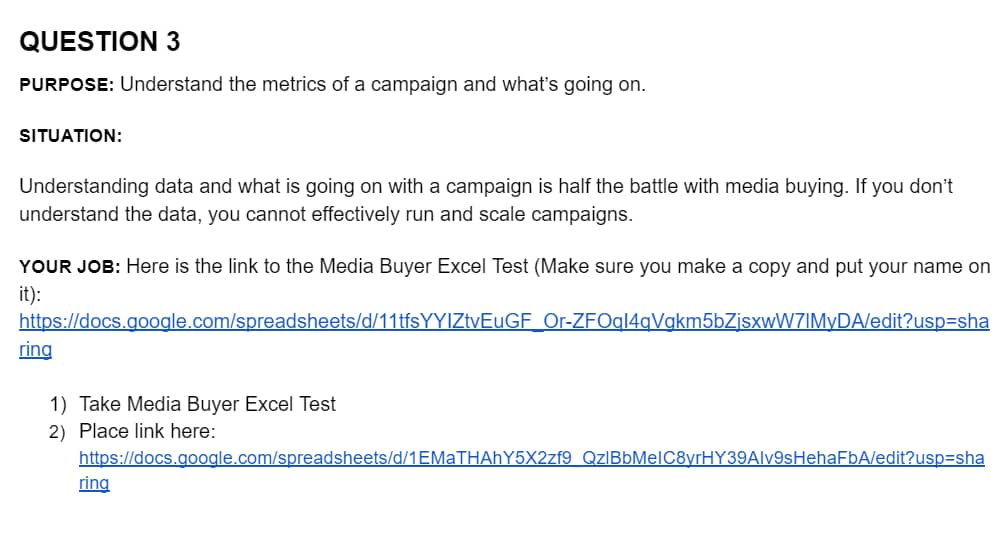
On top of their media buying skills, we also want to see how well they handle client relationships. Media buying is so much more than crunching numbers and really requires a personable person to nourish that relationship with their client roster.

Now we’re trying to gauge their industriousness.
Are they analyzing other top talent in the media buying space?
What skill sets are they looking to develop based on their observational analysis of greats in their space?

Just like they need to figure out the key differentiators of their clients…
What are their own unique edges they observe about themselves?
Do they understand their own strengths and know their role?

Focused Interview
The focused interview goes even deeper into specific information about the media buyer, including:
- Structure for rolling out a new ad campaign
- Their understanding of creatives vs metrics
- The most difficult client they ever encountered and how they got through it
- What tools they use in their day to day operations
- How they deal with clients who don’t want to scale
- How they deal with a clients webinar not working
The goal is to get a comprehensive picture of both their hard and soft skills, understanding of the role, and how they operate.
Ideal Candidate:
The ideal candidate is going to be well-structured and have their own arsenal of winning strategies.
They’ll know that you can’t solve your way through bottlenecks with metrics alone and understand the importance of really good creative.
They will have experienced many failures along their path and will know how to swiftly address hard conversations with clients. From experience, they’ll understand the difficulty of getting clients to scale and how to present thorough plans to convince them it’s the right move.
They will also have an arsenal of tools that they use to track, split test, and get the data they need to make good decisions.
Reference Interviews
First, pick the right references.
Second, ask the candidate to contact the references to set up the calls.
Third, conduct the right number of interviews: you personally do about four and ask your colleagues to do three (for a total of seven reference interviews).
Questions To Ask During the Reference Interviews
Here are five questions to ask the references (Source: Geoff Smart and Randy Street, “Who — The A method for hiring”)
- In what context did you work with the person?
- What were the person’s biggest strengths?
- What were the person’s biggest areas for improvement back then?
- How would you rate his/her overall performance in that job on a 1–10 scale? What about his or her performance causes you to give that rating?
- The person mentioned that he/she struggled with ________________ in that job. Can you tell me more about that?
Ideal Candidate:
Remember that no one is perfect and certainly no relationship is perfect, but hiring a media buyer becomes a lot easier when you know what indicators to look for.
You’re looking for references that have backed up what your potential candidates say, and the candidate will have pretty close to accurate guesses about what their previous employers would rate them and why.
Then, cross reference the ratings they told you their bosses would give them from the WHO Interview.
From here, it should be clear who your best choice is.
Verdict
The point of this entire process is to identify either a “HELL YES” or No—there is no in-between.
After hiring dozens of media buyers, this hiring process brings in top-level talent like clockwork.
99% of companies don’t follow through with a hiring process like this.
…And that’s why 99% of companies fail to bring in good talent to their businesses.
Get Two Vetted Media Buyers With Client Accelerators
Now you know how to hire a media buyer. Instead of going through this whole process, why not install a profit-driven team of experts…including not just one media buyer but TWO: A senior and a junior media buyer?
If it’s of interest for you to hop on a call with our team, then click here and we’ll show you exactly how our team of
- Media Buyers,
- Account Managers,
- Project Managers,
- Copywriters,
- Videographers, And
- Business Data Analysts
work together in unison to help you double your profits.


